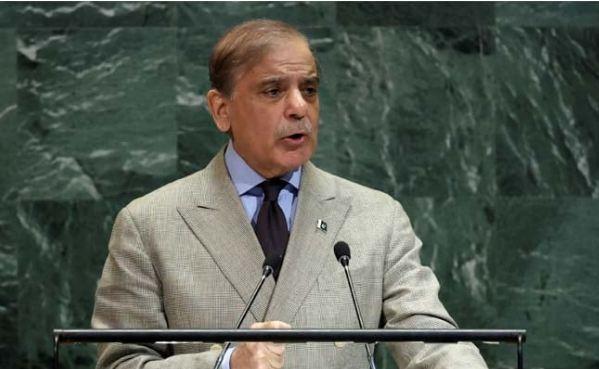“This is my most sincere and serious offer before this assembly of the world nations,” says
WASHINGTON: Prime Minister Shehbaz Sharif told the United Nations General Assembly (UNGA) that Pakistan sought peace in the region after it delivered a “bloody nose” to India in the May conflict.
“We have won the war, and now we seek to win peace in our part of the world, and this is my most sincere and serious offer before this assembly of the world nations,” the prime minister said at the August forum in New York.
Pakistan and India engaged in a four-day fight — their worst in decades — after New Delhi’s unprovoked assault on Islamabad following a terrorist attack in Indian Illegally Occupied Jammu and Kashmir. India blames Pakistan for the attack, a charge that Islamabad has vehemently denied.
At the outset of his speech, the prime minister noted that the world is more complex than ever before: conflicts are intensifying, international laws are being brazenly violated, humanitarian crises are multiplying, terrorism remains a potent threat, disinformation and fake news undermine trust, and climate change threatens our very survival — particularly in countries like Pakistan.
“Today, multilateralism is no longer an option; it is the need of the hour. Pakistan’s foreign policy, guided by Quaid-i-Azam, is based on peace, mutual respect, and cooperation. We believe in the peaceful settlement of disputes through dialogue and diplomacy,” he said.
“Last year, from this very podium, I had warned that Pakistan would act — and act most decisively — against any external aggression. Those words of mine proved true. I hoped they would not. But then, that is destiny. In May this year, my country confronted unprovoked aggression from our eastern front. The enemy came shrouded in arrogance; we sent them back in humiliation, delivering a bloody nose.”
“India sought to extract political gains from a human tragedy by spurning my sincere offer of an independent international investigation into the Pahalgam incident,” he said.
The prime minister added: “Instead, it attacked our cities and targeted our innocent citizens. When our territorial integrity and national security were violated, our response was in accordance with the right of self-defence under Article 51 of the UN Charter.”
“Our valiant armed forces, under the leadership of Asim Munir, mounted an operation of stunning professionalism and bravery, repulsing the enemy’s attack under the air chief marshal. Our falcons took flight and etched their answer across the skies, resulting in seven of the Indian jets turning to scrap and dust — a decisive response. A response to the aggressor that will echo through the annals of history.”
“To the fair architect of this victory, to every officer and soldier, heirs of our martyrs — their names are forever engraved in glory,” he said.
“The mothers of our martyrs — their courage guides our path forward, and their sacrifice shall never be in vain, God willing. And to every Pakistani, you stood as one unbreakable wall — Bunyanum Marsoos,” he added.
“Though in a position of strength, Pakistan agreed to a ceasefire facilitated by President Trump’s bold and vigorous leadership. We express our deep appreciation to him and his team for their active role in bringing about the ceasefire.”
He added that Trump’s efforts for peace helped avert a more threatening war in South Asia. Had he not intervened timely and decisively, the consequences of a full-fledged war would have been catastrophic.
“Who would have lived to tell what happened? And therefore, in recognition of Trump’s wonderful and outstanding contribution to promoting peace in our part of the world, Pakistan nominated him for the Nobel Peace Prize. I think this is the least we can do for his love of peace — truly, he is a man of peace.”
“We have won the war, and now we seek to win peace in our part of the world, and this is my most sincere and serious offer before this assembly of the world nations. Pakistan stands ready for a composite, comprehensive, and result-oriented dialogue with Indian on all outstanding issues.”
“South Asia requires proactive rather than provocative leadership. India’s unilateral and illegal attempt to hold the Indus Water Treaty in abeyance defies the provisions of the treaty itself as well as the norms of international law.”
“Pakistan has made it abundantly clear and led there be no doubt once again in anybody’s mind, as I said last year in this hall from this podium, we will definitely defend the inseparable right of our 240 million people on these waters. To us, any violation of this IWT represents an act of war.”
“Through this house, I wish to assure the Kashmiris that I stand with them, the people of Pakistan stand with them, and one day soon India’s tyranny in Kashmir will come to a grinding halt, Kashmir will gain its fundamental right to self-determination through an impartial plebiscite under the auspices of this very organisation, the UN.”

















